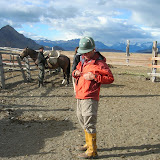I have found Ogden Nash’s poem helpful:
The one-l lama,
He’s a priest.
The two-l llama,
He’s a beast.
And I will bet
A silk pajama
There isn’t any
Three-l lllama.
ll in Argentinian Spanish is not pronounced like y but rather like zh: Zhama
Also, to call someone a guanaco is an insult. It means he cannot be domesticated; he spits.
 The gauchos were impressive horseman. They could make their horses walk sideways. One morning they rounded up some mares that were having a great time around the lodge, and the mares did not want to go into the corral. They gauchos walked their mounts sideways and nudged them into the corral.
The gauchos were impressive horseman. They could make their horses walk sideways. One morning they rounded up some mares that were having a great time around the lodge, and the mares did not want to go into the corral. They gauchos walked their mounts sideways and nudged them into the corral. I am preparing to mount my steed.
I am preparing to mount my steed.






